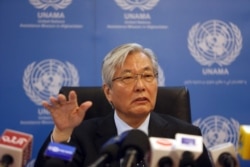The United Nations has denounced the Taliban for publicly threatening to turn media outlets in Afghanistan into military targets, stressing freedom of the press is critical and civilians should never be deliberately targeted with violence.
The Islamist insurgent group earlier this week warned Afghan television and radio stations against airing government-funded advertisements and gave them one week to stop the campaign.
In a statement issued Monday, the Taliban warned media organizations that refuse to stop the “propaganda” they will be considered “military targets” and not independent news outlets, and staff working for them will not be safe.
“I unequivocally condemn this threat and call for it to be rescinded, as words must never be met with violence. The only acceptable challenge to words is to advance a better argument,” said Tadamichi Yamamoto, the head of the U.N. Assistance Mission in Afghanistan (UNAMA).
The messages in question call on Afghans to inform authorities if they see any suspicious Taliban activities.
The “reprehensible threats”, said Yamamoto, “delegitimize the Taliban and deprive it of any claim to represent the people of Afghanistan."
He stressed that media workers are civilians and their fundamental right to operate in an environment free from any threat must be protected.
There was no immediate reaction from the Taliban to the UNAMA statement.
Afghan media is celebrated as one of the success stories since a U.S.-led military coalition ousted the Taliban from power nearly 18 years ago for sheltering al-Qaida leaders accused of plotting the September 11, 2001, attacks on the United States.
Dozens of private television and radio stations have since emerged in the country and many Afghan journalists have died covering the war and in suicide bombings.
Yamamoto noted that press freedom is earned at an "unbearable cost” in Afghanistan and it is hailed as one of the country’s most notable accomplishments.
The Taliban has previously staged deadly attacks against media groups in Afghanistan, a country that remains one of the deadliest in the world for journalists.
The insurgent group issued the threat to media as it prepares to hold the next round of nearly year-long peace negotiations with the United States on Saturday aimed at finding a political solution to the Afghan war.
Critics have been urging Washington to seek guarantees from the Taliban it would not undermine gains Afghanistan has made since a U.S.-led military coalition ousted the Islamic group from power in 2001, particularly the rights of women, freedom of speech and education for all.
The Taliban had banned female education while it was ruling the country before being ousted.










